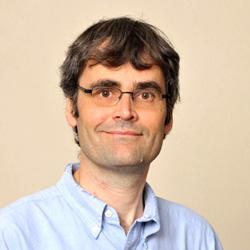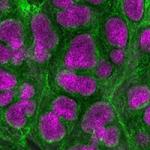
Research Topics
Vertebrate genomes encode hundreds of proteolytic enzymes that act on the surface of cells to regulate a range of biological processes. When missing or inappropriately regulated, these proteolytic enzymes also play a critical role in the development and progression of many important human diseases. The goal of Dr. Bugge’s research is to understand the biochemistry, biology, and pathology of cell-surface proteolytic enzymes. His team is particularly interested in determining their contribution to the development, regeneration, and malignant transformation of oral tissues. He and his colleagues also work on exploiting the detailed knowledge of protease expression in human cancer—generated from basic research studies—to develop novel tumor protease-activated pro-drugs for cancer therapy.
Biography
Dr. Thomas Bugge performed his Ph.D. research on nuclear receptors at the European Molecular Biology Laboratory, Heidelberg, Germany. His postdoctoral studies at Childrens' Hospital Research Foundation, Cincinnati, OH, focused on understanding the biology of fibrinolytic proteins. Dr. Bugge was a research leader at the Finsen Laboratory, Copenhagen, Denmark and associate professor of pediatrics at the University of Cincinnati where he worked on fibrinolytic proteins, before being recruited to his current position at NIDCR in 1999. Dr. Bugge has received several NIH and international awards for his research, mentoring, and service to the scientific community, including the 2012 International Society for Fibrinolysis and Proteolysis Prize for "Outstanding Contributions to the Field of Fibrinolysis, Thrombolysis and Proteolysis," and the 2016 NIH Director’s Ruth L. Kirschstein Mentoring Award “For exemplary performance while demonstrating significant leadership, skill and ability in serving as a mentor. “
Selected Publications
- Silva LM, Doyle AD, Greenwell-Wild T, Dutzan N, Tran CL, Abusleme L, Juang LJ, Leung J, Chun EM, Lum AG, Agler CS, Zuazo CE, Sibree M, Jani P, Kram V, Martin D, Moss K, Lionakis MS, Castellino FJ, Kastrup CJ, Flick MJ, Divaris K, Bugge TH, Moutsopoulos NM. Fibrin is a critical regulator of neutrophil effector function at the oral mucosal barrier. Science. 2021;374(6575):eabl5450.
- Madsen DH, Jürgensen HJ, Siersbæk MS, Kuczek DE, Grey Cloud L, Liu S, Behrendt N, Grøntved L, Weigert R, Bugge TH. Tumor-Associated Macrophages Derived from Circulating Inflammatory Monocytes Degrade Collagen through Cellular Uptake. Cell Rep. 2017;21(13):3662-3671.
- Madsen DH, Leonard D, Masedunskas A, Moyer A, Jürgensen HJ, Peters DE, Amornphimoltham P, Selvaraj A, Yamada SS, Brenner DA, Burgdorf S, Engelholm LH, Behrendt N, Holmbeck K, Weigert R, Bugge TH. M2-like macrophages are responsible for collagen degradation through a mannose receptor-mediated pathway. J Cell Biol. 2013;202(6):951-66.
- Szabo R, Bugge TH. Membrane-anchored serine proteases in vertebrate cell and developmental biology. Annu Rev Cell Dev Biol. 2011;27:213-35.
- Sales KU, Masedunskas A, Bey AL, Rasmussen AL, Weigert R, List K, Szabo R, Overbeek PA, Bugge TH. Matriptase initiates activation of epidermal pro-kallikrein and disease onset in a mouse model of Netherton syndrome. Nat Genet. 2010;42(8):676-83.
Related Scientific Focus Areas


Molecular Biology and Biochemistry
View additional Principal Investigators in Molecular Biology and Biochemistry



This page was last updated on Thursday, November 9, 2023